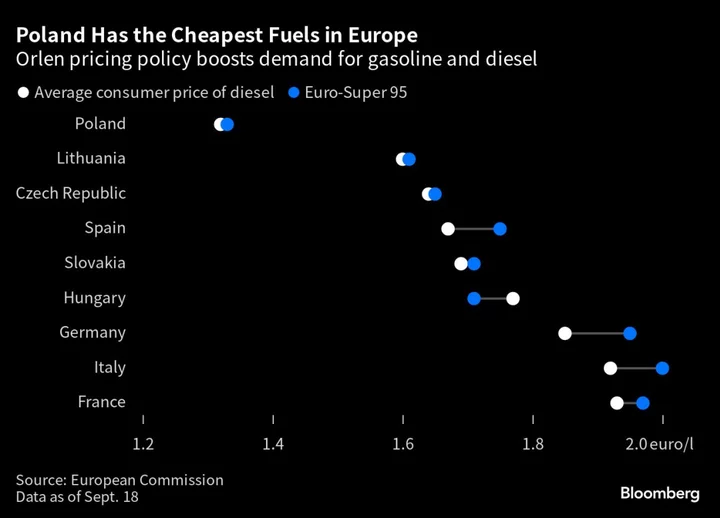Poland’s state-controlled refiner Orlen SA appealed to Poles to refrain from hoarding fuel following reports that its bid to hold down prices is causing shortages of diesel at some gas stations.
Fuel deliveries to Orlen outlets and to its wholesale customers are “uninterrupted” and any temporary shortages are being dealt with, the company said in a video statement released late on Tuesday. The firm also said it has no plans to change its pricing policy that made Polish fuel the cheapest in Europe.
Orlen’s attempt to shield Poles from rising global oil prices ahead of a parliamentary election on Oct. 15 is starting to backfire. Concerns that prices will go up after the vote are bolstering demand. More foreigners are turning up at gas stations near the border as diesel in the European Union’s largest eastern member is about 30% cheaper than in Germany and 20% cheaper than in the Czech Republic.
Shell Plc unit has introduced a 100-liter limit for fuel purchases at some of its stations in Poland, citing limited availability. BP Plc said the situation in Poland is “demanding,” while Hungary’s Mol Nyrt. is monitoring the developments on the Polish market.
“We’ve seen an increase in demand for fuels recently,” Mol said in an email. “If needed, we may consider imposing sale limits at some of the gas stations to ensure supply for our loyal customers.”
In Hungary, attempts to shield consumers from a jump in energy costs in the wake of the Russia-Ukraine war by introducing a fuel price cap in 2022 became unsustainable after a surge in demand, a drop in supply and maintenance at Hungary’s only refinery.
Trigon Dom Maklerski SA brokerage said Orlen’s pricing policy isn’t sustainable and the refiner will need to “significantly” increase prices after the election. Orlen controls 65% of the fuel market and runs 1,900 stations in Poland.
“The logistics has already become very tight and tank trucks aren’t able to deliver fuel on time,” Trigon analyst Michal Kozak wrote in a note.
--With assistance from Agnieszka Barteczko and Piotr Skolimowski.
(Updates with comments from MOL and BP in paragraph 4, Hungarian fuel price case in paragraph 5.)

